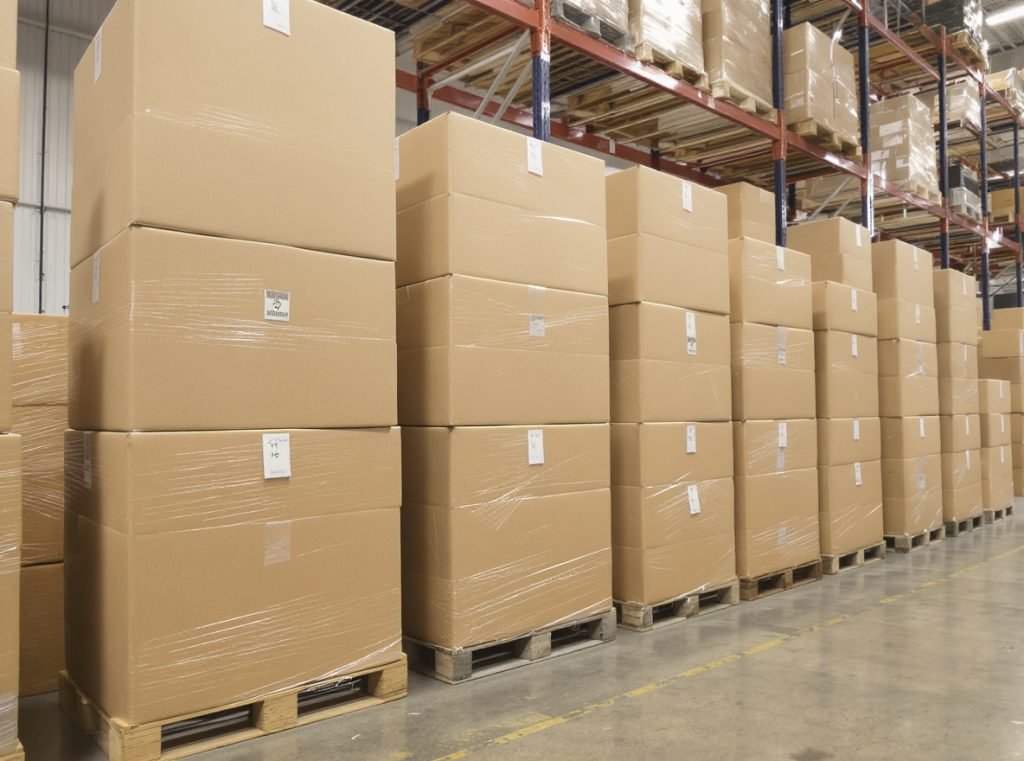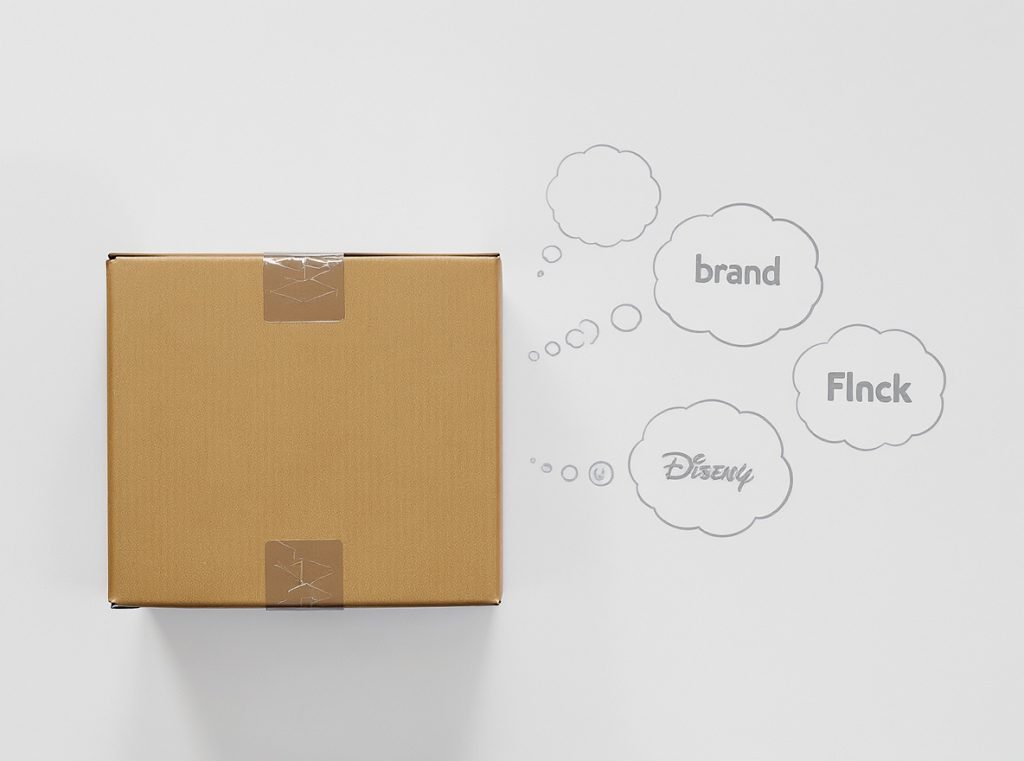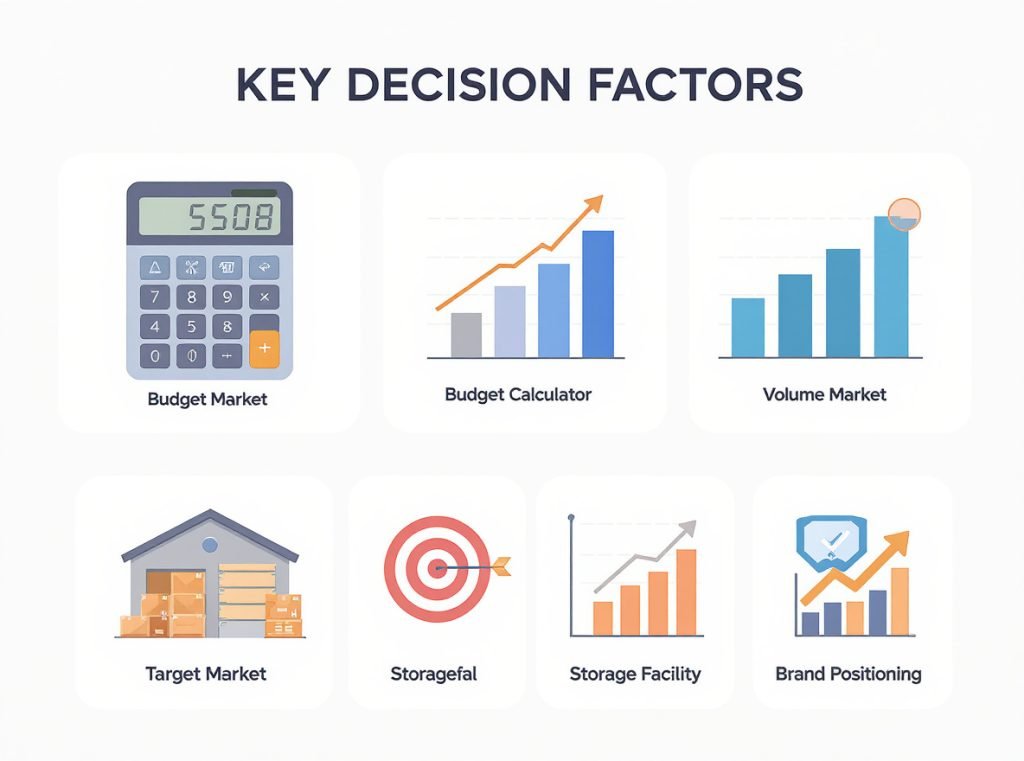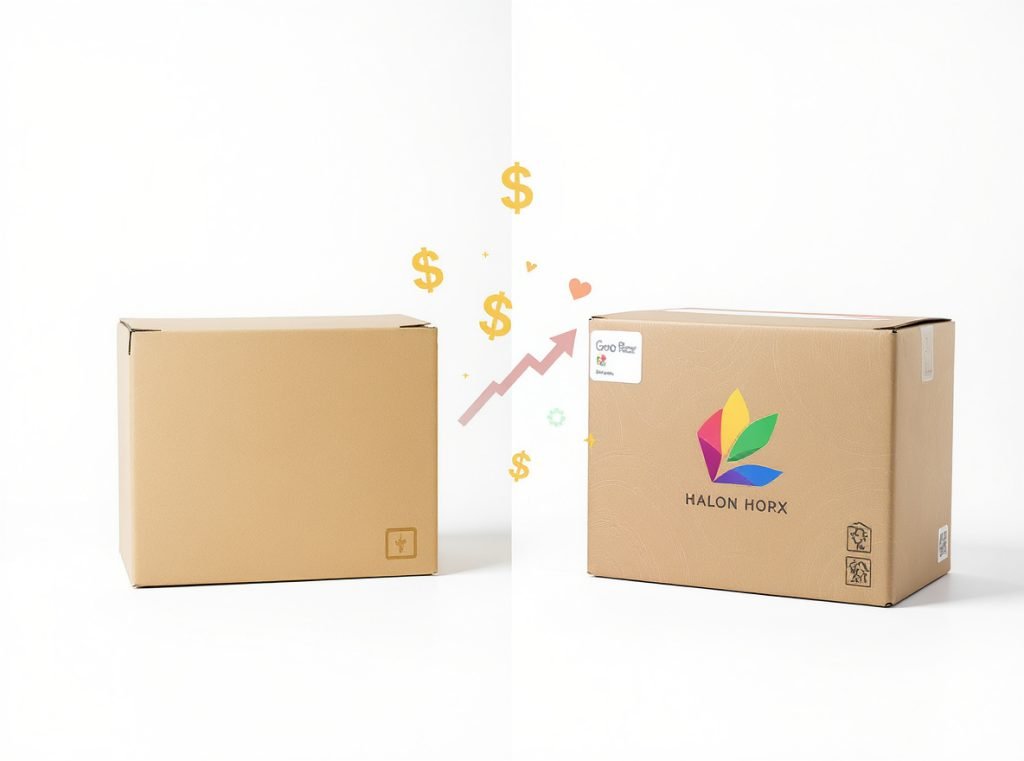Choosing between branded and unbranded shipping boxes creates a fundamental dilemma for businesses worldwide. You want to control costs while building your brand, but the wrong choice could mean missed marketing opportunities or budget overruns. Many companies struggle with this decision, wondering if custom packaging investment will actually pay off or drain their resources.
Branded shipping boxes offer enhanced brand recognition, improved customer experience, and marketing amplification opportunities, but come with 62.5% higher costs and minimum order requirements. Unbranded boxes provide immediate cost savings and operational simplicity while sacrificing brand-building potential and customer engagement opportunities.
Let me walk you through the complete analysis to help you make the right decision for your business.
Table of Contents
ToggleWhat Are the Main Benefits of Using Branded Shipping Boxes?
Understanding branded packaging advantages helps you evaluate whether the investment aligns with your marketing goals and customer experience strategy.
Branded shipping boxes deliver powerful marketing benefits through enhanced brand recognition, memorable unboxing experiences, and social media amplification. Research shows 61% of consumers feel greater excitement opening branded parcels, while 72% admit packaging design influences their purchasing decisions.

Enhanced Brand Recognition and Customer Experience
Branded packaging transforms ordinary deliveries into powerful brand touchpoints that extend your marketing reach beyond digital channels. When customers receive distinctive packaging, it creates immediate brand recognition and reinforces your company identity at their doorstep.
The unboxing experience has become a critical customer interaction, particularly in e-commerce. Custom packaging creates memorable first impressions and builds emotional connections with consumers, fostering loyalty that encourages repeat purchases.
Professional branded packaging also demonstrates attention to detail and quality, helping establish trust with customers. The perceived value associated with attractive, well-designed packaging can justify premium pricing and improve overall brand positioning.
Marketing and Social Media Amplification
Branded boxes provide significant organic marketing opportunities that traditional advertising cannot match. Distinctive packaging encourages customers to share unboxing experiences on social media platforms, generating free advertising and authentic brand exposure.
This user-generated content can significantly expand your brand reach without additional marketing costs. When customers post about their unboxing experience, it influences their social circles and can lead to new customer acquisition through word-of-mouth marketing.
Studies indicate that 52% of consumers are likely to make repeat purchases when products arrive in premium, attractive packaging, demonstrating the long-term value of investing in branded packaging solutions.
Competitive Differentiation and Premium Positioning
Branded packaging helps differentiate your products in crowded markets where similar offerings compete primarily on price. Custom packaging conveys professionalism and quality, establishing trust and credibility with customers.
In markets where competitors use branded packaging, plain boxes can make your products appear less premium or established, putting you at a significant competitive disadvantage.
What Are the Key Drawbacks of Branded Shipping Boxes?
While branded packaging offers compelling benefits, understanding the challenges and costs helps you make an informed decision based on your business capabilities.
The primary drawbacks of branded shipping boxes include 62.5% higher costs compared to plain alternatives, minimum order requirements ranging from 500-1,000 units, extended lead times, and increased package theft risk due to recognizable branding.

Higher Initial Costs and MOQ Requirements
Custom boxes typically cost significantly more than plain alternatives, with prices averaging $1.30 compared to $0.80 for unbranded options. This 62.5% cost increase represents a substantial investment for businesses operating on tight margins.
Most suppliers require minimum order quantities ranging from 500 to 1,000 units for folding cartons and corrugated boxes. These requirements can strain cash flow for small businesses and force you to:
- Commit significant upfront capital
- Maintain larger inventory levels
- Plan packaging needs well in advance
- Accept risk of obsolete stock if designs change
Extended Lead Times and Design Complexity
Custom branded packaging requires longer production times due to design approval processes, printing setup, and quality control requirements. The complex design process can be time-consuming and may require specialized expertise, adding to overall project timelines.
Once committed to a branded design, making changes becomes costly and time-consuming, reducing business flexibility to respond quickly to market changes or rebranding initiatives.
Security Concerns and Package Theft Risk
Branded boxes can inadvertently increase package theft risk by making shipments more conspicuous to porch pirates. Distinctive branding signals valuable contents to thieves, who often target recognizable brand packaging.
This security concern is particularly relevant for:
- High-value consumer products
- Popular brand merchandise
- Electronics and luxury items
- Deliveries in high-theft areas
What Are the Advantages of Using Unbranded Shipping Boxes?
Unbranded packaging offers practical benefits that make it the optimal choice for many business situations, especially those prioritizing cost efficiency and operational flexibility.
Unbranded shipping boxes provide immediate cost savings, instant availability without minimum orders, operational simplicity, and enhanced security through discretion. They’re ideal for businesses with tight margins, fluctuating volumes, or security concerns.

Cost Effectiveness and Immediate Availability
Plain shipping boxes are significantly more affordable and readily available without minimum order requirements or setup fees. This cost advantage extends beyond unit pricing to include reduced inventory management complexity and improved cash flow.
The financial benefits include:
- No design or printing setup costs
- Lower per-unit pricing
- Smaller order quantities possible
- Reduced storage and carrying costs
Operational Simplicity and Flexibility
Unbranded packaging simplifies logistics operations by eliminating design considerations, approval processes, and specialized inventory management. This streamlined approach reduces operational complexity and allows for faster order fulfillment.
Without design constraints, businesses can easily adjust packaging sizes and materials based on changing needs. This flexibility is especially valuable for companies with fluctuating inventory or seasonal variations in shipping volume.
Enhanced Security and Discretion
Plain boxes provide better security against package theft by not advertising their contents or brand affiliation. This discretion is particularly valuable for customers who prefer privacy in their purchases and businesses shipping high-value items.
The security benefits include:
| Security Factor | Branded Boxes | Unbranded Boxes |
|---|---|---|
| Theft Risk | Higher visibility to thieves | Lower profile delivery |
| Content Privacy | Brand suggests product type | No content indication |
| Delivery Discretion | Recognizable branding | Anonymous appearance |
What Are the Disadvantages of Unbranded Shipping Boxes?
While unbranded packaging offers operational and cost advantages, it comes with significant limitations that could impact your brand growth and customer relationships.
Unbranded shipping boxes provide no brand-building opportunities, create lackluster customer experiences, miss marketing potential, and can make products appear lower quality or less professional compared to competitors using custom packaging.

Missed Brand Building Opportunities
The most significant drawback of plain packaging is the missed opportunity for brand building and customer engagement. Unbranded boxes fail to create memorable experiences or reinforce brand identity, essentially making every delivery a generic transaction.
Every plain package represents a wasted touchpoint where you could have:
- Reinforced brand recognition
- Created emotional connections
- Generated social media content
- Communicated brand values and personality
Reduced Customer Engagement and Experience
Plain packaging provides a lackluster unboxing experience that fails to generate excitement or emotional connection with your brand. This missed opportunity can negatively impact customer retention and reduce word-of-mouth marketing potential.
Customers may perceive products in plain packaging as lower quality or less professional, affecting brand positioning and potentially justifying lower pricing expectations in their minds.
Competitive Disadvantage in Premium Markets
In markets where competitors use branded packaging, plain boxes can make your products appear less premium or established. This disadvantage is particularly pronounced in:
- Consumer-focused e-commerce
- Luxury or lifestyle products
- Gift and special occasion markets
- Competitive retail environments
How Do You Choose Between Branded and Unbranded Packaging?
Making the right choice requires evaluating your specific business situation, resources, and strategic goals to determine which option delivers the best return on investment.
Choose branded packaging when building premium brands, serving consumer markets, having sufficient budget for MOQs, and prioritizing customer experience. Select unbranded packaging for cost-sensitive operations, B2B markets, security concerns, or unpredictable shipping volumes.

When to Invest in Branded Packaging
Consider branded packaging when your business situation aligns with these criteria:
Brand building is strategic priority: If customer experience and brand recognition are central to your growth strategy, branded packaging becomes a valuable investment rather than just a cost.
Sufficient order volume: You can meet minimum order quantities cost-effectively and have adequate storage capacity for bulk orders.
Average order value justifies investment: Typically products with $50+ average order values can absorb the additional packaging costs while maintaining healthy margins.
Consumer market focus: B2C businesses benefit significantly more from branded packaging than B2B operations, where unboxing experience carries greater importance.
When Unbranded Packaging Makes Sense
Choose unbranded packaging in these business scenarios:
Cost control priority: When margins are tight and every penny counts toward profitability, plain packaging preserves resources for core business operations.
B2B market focus: Business customers typically prioritize functionality and cost over aesthetic packaging experience.
Security and discretion needs: When shipping high-value items or serving customers who prefer private deliveries.
Fluctuating shipping volumes: If your order volumes are unpredictable or seasonal, avoiding minimum order commitments provides operational flexibility.
Hybrid Packaging Approaches
You don’t need to choose all-or-nothing between branded and unbranded options. Cost-effective hybrid approaches can provide middle-ground solutions:
- Plain boxes with branded stickers or tape
- Custom inserts in standard packaging
- Branded tissue paper or packaging materials
- QR code labels linking to digital brand experiences
What Factors Should Guide Your Packaging Decision?
Several practical considerations will help you evaluate which packaging approach aligns best with your business capabilities and strategic objectives.
Key decision factors include budget capacity for upfront investments, order volume consistency, target market expectations, storage and operational capabilities, brand positioning goals, and competitive landscape analysis. Each factor’s relative importance depends on your specific business situation.

Budget and ROI Analysis
Evaluate your financial capacity realistically by considering both upfront and ongoing costs. While branded packaging requires higher initial investment, potential ROI through increased customer loyalty and organic marketing can be substantial, with studies showing ROI ratios ranging from 9.8 to 34.2.
Calculate packaging costs as a percentage of total product value. Generally, if packaging costs exceed 10-15% of product value, unbranded options may be more practical unless brand building is absolutely critical.
Bulk ordering can reduce per-unit costs by 20-25%, but requires adequate cash flow and storage capacity to realize these savings effectively.
Order Volume and Operational Assessment
Consider your annual shipping volume and ability to meet minimum order quantities efficiently. Analyze your storage capacity, inventory management systems, and design resources before committing to custom packaging programs.
High-volume shippers (1,000+ packages monthly) can typically justify branded packaging investments more easily than low-volume operations.
Seasonal businesses need to carefully evaluate whether consistent packaging needs align with minimum order requirements throughout the year.
Target Market and Customer Expectations
Analyze your customer demographics and industry standards to understand packaging expectations. Consumer brands typically benefit more from branded packaging than B2B companies, while luxury or lifestyle products almost require premium packaging to meet customer expectations.
Research your competitors’ packaging strategies to understand market standards and identify differentiation opportunities. In some markets, branded packaging is expected rather than optional.
Long-term Strategic Alignment
Consider whether packaging aligns with your overall brand positioning and marketing goals. Branded packaging should be viewed as a long-term investment in brand equity rather than just a shipping necessity.
Successful businesses often start with cost-effective unbranded solutions and gradually invest in branded packaging as they scale, establish market position, and develop sufficient order volume to justify the investment.
Summary
The choice between branded and unbranded shipping boxes fundamentally depends on balancing cost considerations with brand-building objectives, operational capabilities, and customer expectations. Branded packaging offers powerful marketing benefits and enhanced customer experience but requires 62.5% higher investment and minimum order commitments. Unbranded packaging provides immediate cost savings and operational flexibility while sacrificing brand-building opportunities and customer engagement potential.

Ready to create packaging that elevates your brand while meeting your budget requirements? At Acreet, we specialize in designing and manufacturing custom packaging solutions that help businesses worldwide differentiate their products and create memorable customer experiences. Whether you need premium branded boxes, cost-effective packaging alternatives, or hybrid solutions, our expert team can develop the perfect packaging strategy for your business. Contact us today to discuss your packaging needs and receive a personalized quote that balances your brand goals with operational realities.


